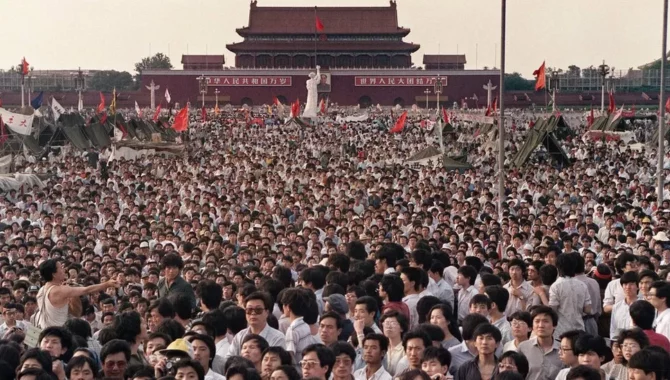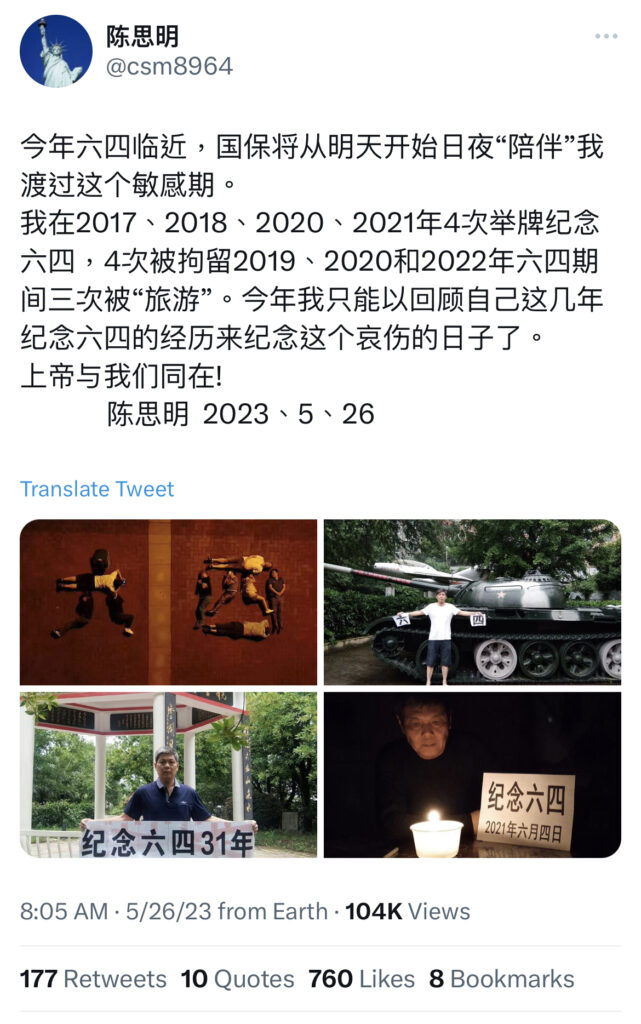34th anniversary of June 4th: Chinese State Bolsters Enforced Amnesia

On the 34th anniversary of June 4th Massacre, we remember the thousands of peaceful protesters gunned down in the streets around Tiananmen Square in Beijing, and countless other victims of atrocities in other Chinese cities in 1989. CHRD reiterates its calls on the Chinese government to allow independent investigation of the massacre, seeking truth and justice for victims and their surviving family members, and holding criminally accountable those responsible for opening fire on unarmed civilians.
“Every year around this time, the country is put on high alert, authorities deploy the security apparatus, warn anyone who might take a public stance, restrict their movement and their speech. And yet, amazingly, there have always been some brave people in China who would break the silence on this taboo during Tiananmen anniversaries,” said Renee Xia, CHRD director. “To defeat the state-enforced amnesia, to keep alive the fight for justice for victims, we must defend these who take tremendous risks to speak to power truth about Tiananmen.”
Dated May 24, 2023, a statement issued by jailed democracy advocate Xu Zhiyong, made public online, calls for an one-day fasting for remembering June 4th. Xu said that every June 4th for the past 10+ years he has fasted, and so have many of his friends. But many have done so quietly. Xu urged people to do so publicly, so as to wake the consciousness of the people in this country.

On May 27, 2023, Chen Siming, an activist based in Hunan, was reportedly “forced to travel” with state security police after he refused police request to delete his tweet about June 4th and threatened him with imprisonment. His had tweeted:
“As June 4th draws near this year, state security police would ‘accompany’ me during this sensitive period of time starting tomorrow. In 2017, 2018, 2020, 2021, I remembered June 4th by holding a protest sign in the streets, and on each of the four occasions I was detained by police. In 2019, 2020, and 2022, I was forced to ‘travel’ during the period of June 4th. This year I can only look back at my history of commemoration of June 4th over these past years on this fateful day. Chen Siming, May 26, 2023.”

Chen was then subsequently detained and is believed to be currently held in a detention center in Zhuzhou, Hunan.
A year ago, on May 25, 2022, Xu Guang, a student protester in Hangzhou in 1989 and a member of the Chinese Democratic Party, was taken away by police as part of “stability maintenance” around the anniversary. Ahead of each year’s anniversary, Xu Guang would hold a banner in public that said “Don’t forget June 4th.”

Xu Guang was later criminally detained and arrested on the charge of “picking quarrels and provoking trouble.” Authorities accused him of posting videos and social media messages on WeChat, Facebook, and Telegram, that were “false” and “harmed the national interests.” Xu Guang was put on trial on April 3, 2023, at the Hangzhou West Lake Court over video conference, as Xu was too weak to attend in person. He has been on hunger strike. He told the court that he was on his hunger strike to remind the world to “never forget June 4th.”
Just days before the June 4th anniversary in 2021, social media activist Wang Aizhong was taken away by authorities. He was held in pre-trial detention for almost two years, until authorities sentenced him to three years in prison on the charge of “picking quarrels and provoking trouble” on May 18, 2023. Wang had previously been detained ahead of the June 4thanniversary in 2014.

The long arm of the Chinese state has even snatched back from abroad a citizen who had persistently tried to remember and remind the public about the 1989 massacre. According to family members, Dong Guangping had tried to seek asylum in Vietnam, but the Chinese government had made some sort of deal to have him deported to China and put him in detention incommunicado at the Zhengzhou Number 3 Detention Center since October 2022. Authorities persecuted Dong Guangping, a former police officer in Zhengzhou, after he signed an open letter on the 10th anniversary of the Tiananmen Massacre in 1999. He was then fired from his job. He continued to commemorate the anniversaries. In 2014, Dong sought asylum in Thailand and received an official UNHCR refugee status. He was set to go to Canada, where he was accepted, in 2015 when the Chinese government forcibly returned him to China and jailed him to three and a half years on the charges of “inciting subversion of state power” and “illegally crossing national borders.”

After his release, Dong went to Vietnam and hid in an apartment in Hanoi for 31 months until he was apprehended by police officers in August of 2022. UN human rights experts sent the Vietnamese government a letter asking about Dong Guangping’s alleged arbitrary arrest and enforced disappearance in Vietnnam as a reprisal for his “legitimate work in the defense of human rights and fundamental freedoms in China,” but the Vietnamese government did not respond. And he went missing until now.
China finally squashed the world’s largest annual vigil for Tiananmen victims in Hong Kong
Hong Kong used to be the only place on the PRC territory where large-scale commemorations of the Tiananmen Massacre would take place on June 4th, drawing over 100,000 people to Victoria Park each year. Chinese authorities have sought to suppress the annual gathering and finally got their way when the National Security Law (NSL) went into effect in Hong Kong in 2020.

Hong Kong authorities have continued to peruse the criminal charge of inciting subversion against Hang Tung Chow, Lee Cheuk-yan, and Albert Ho, the former leaders of the Hong Kong Alliance in Support of Patriotic Democratic Movements of China (“the Alliance”), which organized Hong Kong’s Tiananmen Vigil. Although former Hong Kong Chief Executive told the UN Human Rights Council that the NSL would not be “retroactive,” the police have ordered the group to provide details of all their foreign contacts going back to 2014, which the Alliance has refused to do. In March, a court sentenced Hang Tung Chow, Tang Ngok-kwan and Tsui Hon-kwong to four-and-a-half months for not providing information to the police.
In May 2023, Hong Kong police seized the “Pillar of Shame” statue, a two-ton statue that was installed in the University of Hong Kong in 1997 to pay tribute to those who died in the Tiananmen Massacre. The police explained in a statement that “The National Security Department … conducted searches with a warrant this morning. An exhibit related to an ‘incitement to subversion’ case was seized.” The statue was removed by the University of Hong Kong management in the middle of the night in 2021 due to its fears of “legal risks”.
Hong Kong Chief Executive John Lee implied that no commemorations of June 4th could take place. Asked about whether it was legal to take part in any June 4th related activities, Lee said that police would take resolute action if any activities, especially “public order activities,” contradicted the law. Lee threatened: “Everybody should act in accordance with the law and think of what they do, so as to be ready to face the consequences”.
In a sign that the increased “sensitivity” of the anniversary, prevalent on the mainland, has now spread to Hong Kong, authorities cancelled a film screening of a documentary film, unconnected to June 4th, scheduled on that day.
Last month, local press reported that a new round of books had been pulled from Hong Kong’s public libraries. These newly banned books included Prisoner of the State: The Secret Journal of Zhao Ziyang, a book that detailed the politics behind the decision to launch the violent crackdown on protestors by ousted former CCP General Secretary, and Big Rivers Going to the East, the memoir of Szeto Wah, a founding member of the Alliance.
“Paying tribute to the victims of the massacre has been for so long one of the focal points of Hong Kong’s civil society. Chinese authorities may believe that they have now enforced amnesia on the people in Hong Kong, but in reality, Tiananmen will never be erased from the hearts and minds of the hundreds of thousands of people who took part in the annual Vigil,” said William Nee, CHRD’s Research and Advocacy Coordinator.
“Besides the mountains of historical evidence about the massacre from first-hand accounts, ironically, it’s the authorities’ annual crackdown on June 4th commemoration on the mainland, now in Hong Kong, that keeps reminding the world that the Chinese government’s propaganda and brainwashing have failed and its attempt to erase history and evade accountability is bound to fail too,” Nee added.
For background on the Chinese authorities’ decades-long suppression on efforts by the Chinese people to keep the memories of Tiananmen alive around the anniversaries, see:
Leader Carrie Lam must not let the memory of the Tiananmen Massacre die in Hong Kong on her watch
Enforcing Amnesia, China Detained and Intimidated Activists Around 31st Anniversary of Tiananmen Massacre
31st Anniversary of June Fourth Massacre
We Call on the Human Rights Council to take Action Over China’s 30 Years of Rights Violations Tied to 1989 Tiananmen Massacre, June 17, 2019, CHRD
Suppression Ahead of 30th Anniversary of Tiananmen Massacre, May 30, 2019, CHRD
Former 1989 Pro-Democracy Figures Currently Incarcerated for Continued Human Rights Activism, May 30, 2019, CHRD
China: End Impunity for the 1989 Atrocities and Guarantee Right to Redress, June 2, 2014, CHRD
Individuals Affected by Government Crackdown Around 25th Anniversary of Tiananmen Massacre, CHRD
The Legacy of Tiananmen: 20 Years of Oppression, Activism and Hope, June 1, 2009, CHRD
June 3-4, 2009: 20th Anniversary of Tiananmen Square Massacre – Map & List of Victims

